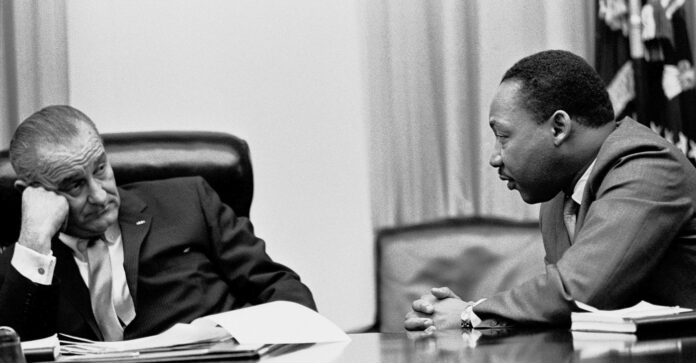
By Congressman James E. Clyburn (D-SC), BlackPress USA
Martin Luther King, Jr. visited Ghana in 1957 to participate in the celebration of the country’s independence from British colonialism. Upon returning home, he delivered a sermon called “The Birth of a New Nation,” and introduced his idea for a post-Jim Crow society in this country. He explained the concept saying, “the aftermath of nonviolence is the creation of the beloved community.” He equated a beloved community to a successful country.
According to Dr. King, the creation of a beloved community would require the American people to address three great evils of society: racism, poverty, and militarism. My friend and former colleague, the late John R. Lewis, arguably Dr. King’s most ardent disciple, often invoked the concept to buttress his calls for a “just society.” John was committed to the pursuit, but I always wondered if such were possible until recently.
The Biden-Harris Administration has planted significant pillars upon which a foundation is being laid to tackle the three great evils and undo the generational impacts of systemic racism in our communities. Their efforts and the response of the American people in last November’s elections have buttressed my faith in such a possibility. President Biden has spearheaded a “whole of government” approach, directing every agency across the federal government to develop policies that make America’s greatness more accessible and affordable to all regardless of skin color.
Racism is a clear and present danger to the success of our “pursuit of a more perfect Union” and the Biden-Harris administration is confronting it. Recognizing the importance of environmental justice to marginalized communities, the Biden-Harris Administration launched the Justice40 Initiative, directing 40 percent of federal investments toward underserved communities disproportionately burdened by pollution.
In their efforts to confront racism directly, the Biden-Harris Administration has begun to address the racial inequities in our health care system. My father often said that if you don’t have your health, you don’t have anything. President Biden signed the PACT Act to make it easier for veterans suffering side effects from the contaminated water, burn pits, and toxins they were exposed to at war to receive the care and benefits they deserve. Considering roughly 43 percent of active-duty military are people of color, this will help our Black veterans and their loved ones receive equitable health care.
Reducing poverty, King’s second great evil, is a priority for the Biden-Harris Administration. The American Rescue Plan, the Infrastructure bill, and the Inflation Reduction Act, have created millions of opportunities for the American people to achieve upward economic mobility. President Biden’s targeting of student loan debt relief will relieve the disproportionate economic burden of student loan debt from the shoulders of over 1.6 million vulnerable borrowers. It will also restructure repayment plans to make them borrower friendly.
Home ownership is one of the quickest and sustainable ways out of poverty. President Biden’s Housing Supply Action Plan is designed to help close the housing supply shortfall in 5 years by increasing the supply and preserving the existence of affordable housing across the country. There is an extreme mismatch between the supply of and demand for affordable homes. Closing this gap will create more affordable rental units and purchase options for low- and moderate- income families.
Dr. King’s third evil, militarism, has not gone un-responded to by the Biden-Harris administration. No one can forget the images of police outfitted with military-grade equipment in cities across the country during recent racial justice protests. The militarization of police is a phenomenon that endangers everyday citizens and precipitates violent policing.
The Bipartisan Safer Communities law reforms policing by investing in violence interruption funding and children and family mental health services. The law provides over $250 million for community-based violence prevention programs, empowering communities to interrupt the cycle of violence by intervening on behalf of those most likely to commit offenses that require police attention. Similarly, bolstering programs and organizations that can help prevent and respond to emergency calls instead of armed police officers could stop incidents from ending in police violence.
In 2022, President Biden signed an Executive Order on Advancing Effective, Accountable Policing and Criminal Justice Practices to Enhance Public Trust and Public Safety. This order mandates the reporting of police misconduct and use-of-force incidents and orders all federal law enforcement agencies to revise their use-of-force policies. Now Federal agencies cannot transfer or sell military equipment to state, local, and tribal law enforcement agencies, cutting down on the militarization of our local police departments.
For us to continue our pursuit of a more perfect union, we must embrace Dr. King’s vision of a blessed community and confront the injustices that have stymied that pursuit for centuries. It is our solemn duty as Members of Congress to put forth legislation that advances liberty and justice for all. But for all our successes, much remains to be done. As we pause to commemorate and celebrate the life and legacy of Dr. Martin Luther King, Jr. Hopefully, as we move beyond this year’s celebration, we will revisit this idea of a beloved community and recommit ourselves to making his dream, the American Dream, a reality.


